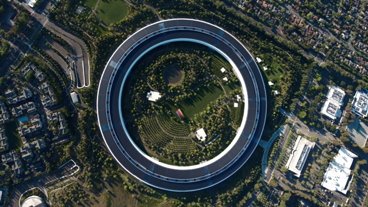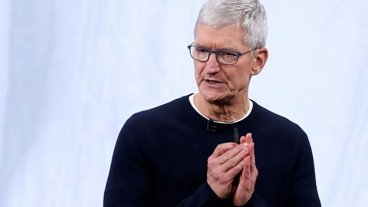International sales rescue Apple from US retail slump
Analyst Kathryn Huberty of Morgan Stanley has been bemoaning "the current macroeconomic environment" in her pessimistic outlook for Apple for some time now. Huberty predicted sales of only 16 million iPods the winter quarter of 2008, but Apple actually sold 22.7 million. That's a new record for the company, and comes at a particularly improbable point a year after analysts tanked the company's stock with dire warnings that Apple's retail sales would collapse with the slowing economy.
While US iPod sales were down slightly, Apple now has strong sales fueling stellar growth globally. Apple COO Tim Cook noted in the company's quarterly financial report conference call that that "US iPod sales contracted, at the unit level, 3% year over year," adding that "all the growth you see in our numbers, 22.7%, was all international."
Mac sales were also up, due in part to Apple's global reach. However, the PC market in general has actually contracted, making Apple's growth particularly noteworthy. Cook noted, "When you think about the macroeconomic environment, I think it's a great result. Â We grew 9% on a sale basis and we did take the channel inventory down some. The market has projected from IDC that the worldwide market actually contracted. Â So you're comparing 9% to a negative number so I feel very happy about that."
Cook added, "Mac sales were the second-highest in our history and only surpassed by 3% in our best quarter. The October year over year data on the Mac is very good and the portables all quarter as a matter of fact led to this which is a pretty stunning number; 34% year over year increase on portables despite the environment. Â International vs the US, international on Mac was much stronger than the US. International growth was 16% on Macintosh year over year, 2% in US. Â We saw several countries over 20%."
Retail impact on international sales
Apple CFO Peter Oppenheimer added, "The retail performance outside the US was a bit stronger similar to what we saw in other parts of the business as Tim [Cook] alluded to in David's question. Â We think our retail stores are helping us in each of our geographies, they are a great place for new customers particularly those new to the Mac to come experience our products and understand them. Â
Oppenheimer added, "Some choose to buy in our stores, some choose elsewhere, we're find with either. Â We just want to make sure the Macs have a great point of sale for customers to experience them, and that's why we're opening the stores. Â We plan to open about 25 in financial year 2009 and half will be international."
Earlier in the call, Cook had also noted plans to expand Apple's retail store network with 25 additional stores. "Half will come internationally and Ron [Johnson, senior vice president of Apple's retail operations] and his team are continuing to be very selective with real estate and won't take a bad site."
Cook said, "Our stores are amazingly productive and providing outstanding service to our customers. The environment around us was a bit tough but the stores performed very well, we are very confident in our stores and the asset we're building."
MacBook mania
One specific element fueling Mac sales was the new unibody MacBook line refresh. "We felt people were delaying purchases on rumors of the new portable," Cook said. "We saw again a spike at the end of the quarter, not as strong as iPods, but created by the economic environment and consumer reaction to it."
A year ago, Apple's Mac sales were driven by the newly redesigned iMac, which resulted in a blockbuster 53% growth in Apple's desktop sales. That model wasn't refreshed this fall, focusing all attention upon the new portables. The result was a major shift in Apple's business from desktops to notebooks. Apple noted that 71% of its Macs sold were notebooks, the highest portable mix the company has ever seen.
At a time when the industry seems enamored with low cost netbooks, Apple has been skimming of the cream of the much more profitable notebook market, and delivering a more sustainable product that has customers returning for software purchases and training. Most netbooks are limited in the software they can run because of their physical and performance restrictions.
Historic Apple markets down
Without the push into the premium and consumer notebook territories, a drive that Apple began during the post dotcom bubble recession at the beginning of the decade, Apple would likely have found itself in trouble during the current economic downturn. Apple's higher end desktop machines, while popular among designers and others that made up Apple's historic core of customers, are now a relatively small part of Apple's overall business.
Cook said, "the Mac Pro segment of our desktop business isn't large, it's primarily iMac. The Pro segment was down year over year as you might expect because small businesses are cutting back on expenditures in this current economic climate."
Another historic market strength for Apple has been education, which is being hit hard as governments slash budgets in response to lower tax revenues caused by the downturn. Cook noted, "if you look at our results last quarter we were down 6% year over year in total and if you look at the K-12 total component of that, more sensitive to state budgets, down 12% year over year."
Cook added that there is "very significant funding uncertainty in this environment. State budget shortfalls are almost everywhere. Â 39 out of the 50 states have some sort of shortfall. Â K-12 in Q4 was weak, we don't forecast individual markets but we don't see this picking up until there's a huge infrastructure outlay and hopefully with the new president we will get some of that underway."
 Prince McLean
Prince McLean










 Mike Wuerthele
Mike Wuerthele
 Malcolm Owen
Malcolm Owen
 Chip Loder
Chip Loder

 William Gallagher
William Gallagher
 Christine McKee
Christine McKee
 Michael Stroup
Michael Stroup
 William Gallagher and Mike Wuerthele
William Gallagher and Mike Wuerthele







